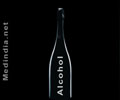Alcohol consumption can make one happy or sad depending on their genetic make-up, says study.

The discovery could explain why some drinkers become angry and upset if they get intoxicated while others become merry and silly, reports the Telegraph.
It could also predict who is likely to have a problem with drink - those who get 'high' from alcohol are far more likely to become addicted.
Though often described as a depressant, alcohol contains a mixture of stimulant and sedative effects, with some treating it as a social lubricant and others as a 'downer'.
It had been suggested that people who get less effect from alcohol drink more heavily to compensate.
Prof Andrea King and her team suggested heavy drinkers were actually more sensitive to the euphoric effects of drink - and less sensitive to its sedative side.
Advertisement
The researchers recruited nearly 200 subjects aged between 21 and 35, and divided them into heavy and light drinker groups, with the heavier group consuming ten to 40 drinks a week and bingeing at least once - averaging more than five drinks in two hours.
Advertisement
They were given one of three drinks; a placebo, a low alcohol drink and a high alcohol drink, each flavoured to mask the content.
None of the subjects was even aware the study concerned alcohol.fterwards they filled out a survey describing their moods and were breathalysed.
The light drinkers were more sensitive to the overall effects of the drink, but described their feelings as sluggish and sedated.
In contrast, the heavy drinkers reported positive and rewarding effects.
"They both had very similar blood alcohol concentration curves, but the effects of alcohol were markedly different, " said King.
"In other words, you can take a 150-pound male light drinker and a 150-pound male heavy drinker and give them each the exact same dose of alcohol, but their brains respond very differently to this substance, hence the divergent experiences and mood reports after consumption. It's really fascinating," she added.
The study is published in Archives of General Psychiatry.
Source-ANI















